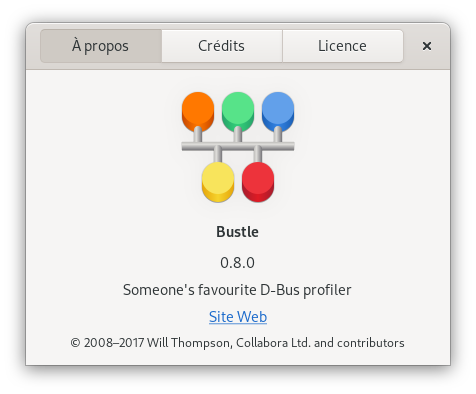I recently had a few weeks off work, and mostly did a good job of staying away from my computer. However, I couldn’t resist putting in a few hours to release Bustle 0.8.0, someone’s favourite D-Bus profiler. Get it on Flathub today!

The main user-facing change is a great new icon, designed and drawn by Tobias Bernard. (Unfortunately the Flathub website still shows the old one for CDN cache reasons, but you can feast your eyes above or in your favourite app centre.)
I also rewrote some parts of the app from Haskell to C. In particular, it no longer uses the Haskell D-Bus implementation and libpcap binding, instead using GDBus and GVariant (via some minimal hand-written FFI bindings) and some mostly-existing C code, respectively. Me circa 2008 would be horrified to learn that I’ve done this, and me circa 2020 is sad to be introducing more unsafe code, but the net result is a smaller app with way fewer transitive dependencies.
Why can’t it use GDBus via GObject Introspection, you ask? GLib didn’t have a D-Bus implementation in 2008, and there was no GObject Introspection support for Haskell. These days, bindings for Gio etc. generated via GObject Introspection exist, but migrating Bustle to these would amount to a rewrite, and I don’t have the time or stomach for that. (These libraries all have my name on them because I made a small start at the generator back in 2011 with the express goal of using them in Bustle, but I’d be amazed if any of my work is still present.)
I’ve been fortunate to have had a dozen or so contributors to Bustle over the years, but it’s certainly true that my choice of implementation language has been a big barrier to entry for other contributors. I maintain that it was not a bad choice in and of itself for a weekend project: in 2008, a time before GObject Introspection was widely available, the Haskell GTK and Cairo bindings were unusually thorough and well-written and allowed me to write concise code and iterate quickly. But going against the grain of the community has a cost: the intersection of “Haskell programmer”, “D-Bus expert” and “GNOME enthusiast” is a very small set, and I know several people personally who were interested in contributing until they saw the language.
Why C rather than Rust, you ask? If you want to try to glue Cabal, Cargo and C together, be my guest.
(In case the joke in the title doesn’t translate outside the UK: busman’s holiday on Wiktionary.)
